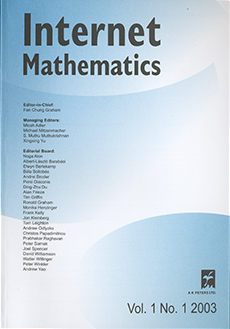Abstract
Motivated by the problem of detecting link-spam, we consider the following graph-theoretic primitive: Given a webgraph $G$, a vertex $v$ in $G$, and a parameter $\delta \in (0,1)$, compute the set of all vertices that contribute to $v$ at least a $\delta$ fraction of $v$'s PageRank. We call this set the $\delta$-contributing set of $v$. To this end, we define the contribution vector of $v$ to be the vector whose entries measure the contributions of every vertex to the PageRank of $v$. A local algorithm is one that produces a solution by adaptively examining only a small portion of the input graph near a specified vertex. We give an efficient local algorithm that computes an $\epsilon$-approximation of the contribution vector for a given vertex by adaptively examining $O(1/\epsilon)$ vertices. Using this algorithm, we give a local approximation algorithm for the primitive defined above. Specifically, we give an algorithm that returns a set containing the $\delta$-contributing set of $v$ and at most $O(1/\delta)$ vertices from the $\delta/2$-contributing set of $v$, and which does so by examining at most $O(1/\delta)$ vertices. We also give a local algorithm for solving the following problem: If there exist $k$ vertices that contribute a $\rho$-fraction to the PageRank of $v$, find a set of $k$ vertices that contribute at least a $(\rho-\epsilon)$-fraction to the PageRank of $v$. In this case, we prove that our algorithm examines at most $O(k/\epsilon)$ vertices.
Citation
Reid Andersen. Christian Borgs. Jennifer Chayes. John Hopcroft. Vahab Mirrokni. Shang-Hua Teng. "Local Computation of PageRank Contributions." Internet Math. 5 (1-2) 23 - 44, 2008.
Information




